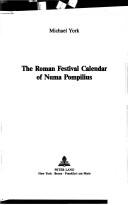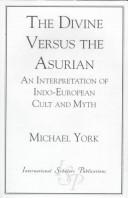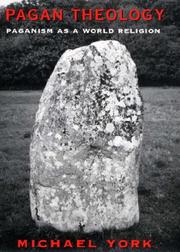| Listing 1 - 10 of 19 | << page >> |
Sort by
|

ISBN: 0820403075 9780820403076 Year: 1986 Volume: 2 Publisher: New York: Lang,
Abstract | Keywords | Export | Availability | Bookmark
 Loading...
Loading...Choose an application
- Reference Manager
- EndNote
- RefWorks (Direct export to RefWorks)

ISBN: 157309028X 9781573090285 Year: 1995 Publisher: San Francisco (Calif.): International scholars publ.,
Abstract | Keywords | Export | Availability | Bookmark
 Loading...
Loading...Choose an application
- Reference Manager
- EndNote
- RefWorks (Direct export to RefWorks)

ISBN: 0847680010 Year: 1995 Publisher: Totowa Rowman & Littlefield
Abstract | Keywords | Export | Availability | Bookmark
 Loading...
Loading...Choose an application
- Reference Manager
- EndNote
- RefWorks (Direct export to RefWorks)
#SBIB:011.GIFTSOC --- #SBIB:316.331H450 --- Morfologie van de godsdiensten: religieuze bewegingen en sekten --- New Age movement --- New Age movement. --- Paganism --- History --- Civilization, Pagan --- Heathenism --- Religions --- Aquarian Age movement --- Cults --- Social movements --- Occultism --- Great Britain --- United States --- Religion

ISBN: 0814797024 Year: 2003 Publisher: New York (N.Y.): New York University press
Abstract | Keywords | Export | Availability | Bookmark
 Loading...
Loading...Choose an application
- Reference Manager
- EndNote
- RefWorks (Direct export to RefWorks)
291.17 --- Religions --- Paganism --- Civilization, Pagan --- Heathenism --- Comparative religion --- Denominations, Religious --- Religion, Comparative --- Religions, Comparative --- Religious denominations --- World religions --- Civilization --- Gods --- Religion --- Areligiositeit. Volkeren zonder godsdienst. Heidenen --- Paganism. --- Religions. --- 291.17 Areligiositeit. Volkeren zonder godsdienst. Heidenen
Book
ISBN: 3319189220 3319189239 Year: 2016 Publisher: Cham : Springer International Publishing : Imprint: Springer,
Abstract | Keywords | Export | Availability | Bookmark
 Loading...
Loading...Choose an application
- Reference Manager
- EndNote
- RefWorks (Direct export to RefWorks)
This book is the first comprehensive examination of the ethical parameters of paganism when considered as a world religion alongside Christianity, Islam, Judaism, Hinduism and Buddhism. The issues of evil, value and idolatry from a pagan perspective are analyzed as part of the Western ethical tradition from the Sophists and Platonic schools through the philosophers Spinoza, Hume, Kant and Nietzsche to such contemporary thinkers as Grayling, Mackie, MacIntyre, Habermas, Levinas, Santayana, etc. From a more practical viewpoint, a delineation of applied pagan ethics is then presented in connection with current moral issues such as same-sex union, recreational drugs, environmental awareness, abortion and terrorism. Finally, overviews of sectarian pagan ethics (Shinto, Santeria, Heathenism, Druidry, Romuva, Slavic, Kemeticism, Classical and Wicca) provide both the general and pagan reader with an understanding of the provocative range and differentiation of pagan ethical thought. The book approaches the Western ethical tradition as an historical development and a continuing dialogue. The novelty of this approach lies in its consideration of paganism as a legitimate voice of religious spirituality rather than a satanic aberration or ridiculous childish behavior. The book is aimed at both the contemporary Western pagan and anyone with an interest in the moral dilemmas of our times and the desire to engage in the global ethical discussion.Among the more important features of the book are its presentation of a re-evaluation of idolatry, the notion of the virtue value, the richness of the pagan tradition, and the expansion of Western ethics beyond its Christian heritage.
Paganism. --- Religions. --- Religion - General --- Religion --- Philosophy & Religion --- Comparative religion --- Denominations, Religious --- Religion, Comparative --- Religions, Comparative --- Religious denominations --- World religions --- Civilization, Pagan --- Heathenism --- Civilization --- Gods --- Religions --- Religion. --- Ethics. --- Religious Studies, general. --- Sociology of Culture. --- Deontology --- Ethics, Primitive --- Ethology --- Moral philosophy --- Morality --- Morals --- Philosophy, Moral --- Science, Moral --- Philosophy --- Values --- Religion, Primitive --- Atheism --- God --- Irreligion --- Theology --- Culture. --- Cultural sociology --- Culture --- Sociology of culture --- Popular culture --- Social aspects

ISBN: 0810848732 Year: 2004 Publisher: Lanham ; Oxford The Scarecrow Press
Abstract | Keywords | Export | Availability | Bookmark
 Loading...
Loading...Choose an application
- Reference Manager
- EndNote
- RefWorks (Direct export to RefWorks)
New Age movement --- Dictionaries --- English --- New Age --- aspects --- trends --- groups --- practice --- alternative medicine --- yoga --- feng-shui --- aromatherapy --- new spirituality --- philosophy --- religion --- spokespeopleleaders --- human potential --- self-help practices --- countercultural spiritual development --- dictionary
Digital
ISBN: 9783319189239 Year: 2016 Publisher: Cham Springer International Publishing
Abstract | Keywords | Export | Availability | Bookmark
 Loading...
Loading...Choose an application
- Reference Manager
- EndNote
- RefWorks (Direct export to RefWorks)
This book is the first comprehensive examination of the ethical parameters of paganism when considered as a world religion alongside Christianity, Islam, Judaism, Hinduism and Buddhism. The issues of evil, value and idolatry from a pagan perspective are analyzed as part of the Western ethical tradition from the Sophists and Platonic schools through the philosophers Spinoza, Hume, Kant and Nietzsche to such contemporary thinkers as Grayling, Mackie, MacIntyre, Habermas, Levinas, Santayana, etc. From a more practical viewpoint, a delineation of applied pagan ethics is then presented in connection with current moral issues such as same-sex union, recreational drugs, environmental awareness, abortion and terrorism. Finally, overviews of sectarian pagan ethics (Shinto, Santeria, Heathenism, Druidry, Romuva, Slavic, Kemeticism, Classical and Wicca) provide both the general and pagan reader with an understanding of the provocative range and differentiation of pagan ethical thought. The book approaches the Western ethical tradition as an historical development and a continuing dialogue. The novelty of this approach lies in its consideration of paganism as a legitimate voice of religious spirituality rather than a satanic aberration or ridiculous childish behavior. The book is aimed at both the contemporary Western pagan and anyone with an interest in the moral dilemmas of our times and the desire to engage in the global ethical discussion.Among the more important features of the book are its presentation of a re-evaluation of idolatry, the notion of the virtue value, the richness of the pagan tradition, and the expansion of Western ethics beyond its Christian heritage.
General ethics --- Religious studies --- Sociology of culture --- Didactics of religion --- sociologie --- theologie --- cultuur --- ethiek --- godsdienst --- boeddhisme --- hindoeïsme --- Homosexuality

ISBN: 0814797385 0814797083 0814789021 0814797024 Year: 2003 Publisher: New York NYU Press
Abstract | Keywords | Export | Availability | Bookmark
 Loading...
Loading...Choose an application
- Reference Manager
- EndNote
- RefWorks (Direct export to RefWorks)
In Pagan Theology , Michael York situates Paganism-one of the fastest-growing spiritual orientations in the West-as a world religion. He provides an introduction to, and expansion of, the concept of Paganism and provides an overview of Paganism's theological perspective and practice. He demonstrates it to be a viable and distinguishable spiritual perspective found around the world today in such forms as Chinese folk religion, Shinto, tribal religions, and neo-Paganism in the West. While adherents to many of these traditions do not use the word "pagan" to describe their beliefs or practices, Yo
Paganism. --- Religions. --- Paganism --- religion --- theology --- Pagan theology --- Chinese folk religion --- Shinto --- tribal religion --- neo-Paganism --- Buddhism --- Hinduism
Book
ISBN: 9780814789025 Year: 2003 Publisher: New York, NY
Abstract | Keywords | Export | Availability | Bookmark
 Loading...
Loading...Choose an application
- Reference Manager
- EndNote
- RefWorks (Direct export to RefWorks)
Multi
ISBN: 9780814789025 Year: 2003 Publisher: New York, N.Y. New York University Press
Abstract | Keywords | Export | Availability | Bookmark
 Loading...
Loading...Choose an application
- Reference Manager
- EndNote
- RefWorks (Direct export to RefWorks)
| Listing 1 - 10 of 19 | << page >> |
Sort by
|

 Search
Search Feedback
Feedback About UniCat
About UniCat  Help
Help News
News